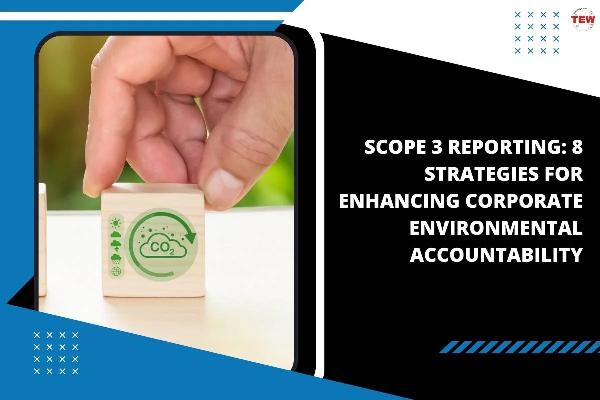8 Strategies for Enhancing Corporate Environmental Accountability | The Enterprise World

Strong 8k brings an ultra-HD IPTV experience to your living room and your pocket.
Scope 3 Reporting: 8 Strategies for Enhancing Corporate Environmental Accountability
Scope 3 Reporting: 8 Strategies for Enhancing Corporate Environmental Accountability | The Enterprise World
According to the Corporate Value Chain, commonly known as Scope 3, companies must assess their entire value chain emissions impact and determine where they should make adjustments. Managing these Scope 3 Emissions is an important task for organizations looking to minimise their carbon footprint and impact. So, what strategies should an organization implement to reduce its emissions and enhance climate change? Read on to find out.
8 strategies for enhancing corporate environmental accountability:
1. Harnessing the Power of Renewable Energy
According to a recent study, burning fossil fuels accounts for more than 74% of total GHG (Green House Gases) emissions. These gas emissions blanket the Earth thus trapping the sun’s heat and contributing to a deterioration in the global climate change.
By adopting renewable energy sources, you minimise carbon emissions and air pollution. This results in improved reliability and resilience of the power grid. With sources such as solar, your company boasts of lower energy costs thus saving you money in the long run. This Scope 3 carbon reduction strategy saves you money as you save Mother Earth.
2. Go for Energy-Efficient Equipment
Scope 3 Reporting: 8 Strategies for Enhancing Corporate Environmental Accountability | The Enterprise World
Energy-efficient equipment falls under the eco-friendly options for different reasons. The first and most popular among organisations is that they use less energy. This further implies that they waste less energy and fewer resources.
For instance, using LED light bulbs and motion sensors (for uncommonly used spaces) minimises your carbon footprint as a company while still saving you money on energy and water bills. This shows how seriously you take your environmental responsibility as a corporation.
3. Providing Alternative Means of Transportation
What modes of transportation do you use at your company? While most people have the urge to have a car, it increases the carbon footprint thus hurting Mother Earth. You need to encourage your employees to adopt other alternatives such as public transportation, walking, or biking. If they must use private means, consider carpooling and providing incentives for the same. A great way would be to reserve parking spots for carpoolers.
4. Implementing a Recycling Program
Recycling stands out as one of the easiest ways to reduce waste. At your organization, you can begin by minimising the waste and enacting a recycling program. You can begin by ensuring that your employees and clients separate paper and plastic from other biodegradable materials such as compost waste.
With the right waste disposal plan, you can promote your company’s environmental sustainability and reduce money spent on disposal. The waste control companies do not waste time or money trying to sort the recyclable from the unrecyclable materials.
5. Go Paperless
Scope 3 Reporting: 8 Strategies for Enhancing Corporate Environmental Accountability | The Enterprise World
Gone are the days when one needed to walk around with a huge load of papers or files when working. With technological advancements, everyone in the workplace can easily access all the information from their devices. This ensures that the employees work faster as they can share files and collaborate without requiring actual papers.
Going paperless has had a huge positive impact on the environment as it has reduced deforestation and pollution. With more trees, and more carbon dioxide (CO2) absorbed, the Earth experienced a slowed-down ozone layer thinning.
6. Embrace Green Cleaning Products and Materials
Volatile Organic Compounds (VOCs) are the number one cause of poor air quality. These chemicals vaporise at room temperature which can produce dangerous pollutants indoors and outdoors. When released, they may cause chronic respiratory problems and are responsible for most allergic reactions.
Using green cleaning products hugely minimises the toxins and chemicals in the environment as they are made from natural ingredients. Apart from bettering the environment, they also benefit the employees by reducing the chances of allergic reactions. To further promote indoor air quality, consider adding some indoor plants at the workplace. Strategically placing them creates a conducive environment for your employees.
7. Working with Environmentally-Friendly Vendors
Scope 3 Reporting: 8 Strategies for Enhancing Corporate Environmental Accountability | The Enterprise World
With greater access to information and the influence of social media, more people have become environmentally conscious. They have realised that individual actions can make a huge difference in minimising carbon footprint and making the world a better place.
A recent study by the IBM Institute for Business Value Survey shows that 62% of consumers admitted to changing their purchasing habits to minimise the environmental impact. Half of these consumers are willing to pay a premium for sustainability which is a plus for you as you won’t lose out on customers by going green.
Whatever industry you are in, you need to strive to work with environmentally friendly vendors. This will see you maintain the same standards even in your company. For instance, if you are in the food industry, ditch plastic and go for biodegradable or dissolvable Scope 3options.
8. Track Your Progress
After employing all these strategies for enhancing corporate environmental accountability, you must measure and track your progress. Keep a record of everything you have done and assess their effectiveness after some time. This helps you identify areas that your company is doing well and where it needs improvements. During your assessments, include feedback from your clients, employees, and stakeholders. With this information, you can forge ahead and make environmentally conscious decisions.
Direct and indirect emissions as covered by the Scope 3 come from various sources. As seen, all the above strategies aim to promote sustainability and environmental-friendliness all around. Begin by implementing a proper recycling plan and encouraging other sustainable practices at the workplace. This includes embracing renewable sources of energy and going paperless. Outside your environment, remember to work with environmentally friendly vendors and play your part in making the world a more sustainable place.
Note: IndiBlogHub features both user-submitted and editorial content. We do not verify third-party contributions. Read our Disclaimer and Privacy Policyfor details.


